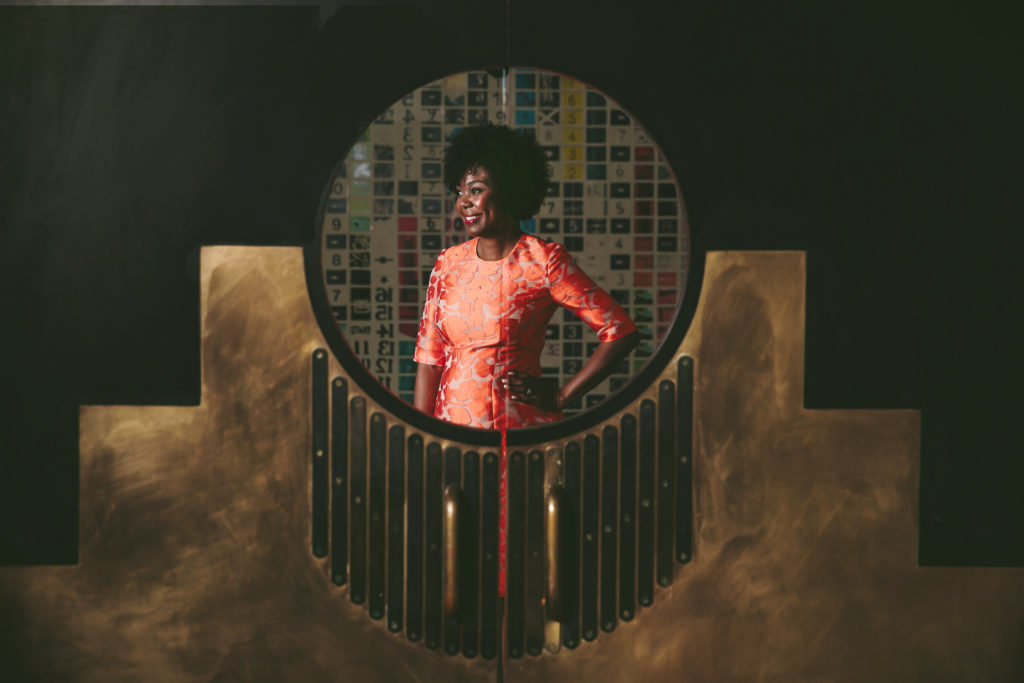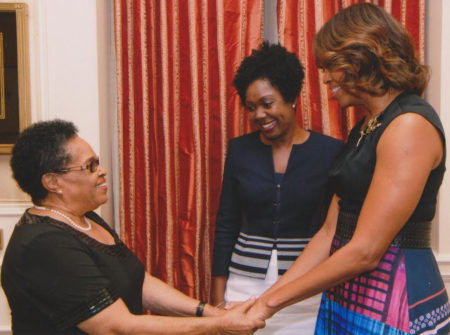Setting the example as Lenovo’s vice president of global human resources and chief diversity officer, Yolanda Lee Conyers has helped grow the company’s revenue from $3 billion to $43 billion, a competitive advantage she pinpoints to diversity in the workplace, a strength that starts at the top.
By Missy Sharpe, Photos by Andrew Chan, Hair by April Kearney, Makeup by Mandy Morrison, Styled by Niki Jones, Shot on location at Austin Film Society

Yolanda Lee Conyers has always enjoyed a challenge and stepping outside her personal comfort zone. From becoming the first African-American female engineer hired at Dell to moving to Beijing and writing The Lenovo Way about her time in China to becoming the first chief diversity officer for Lenovo, a Chinese heritage company that made history by purchasing IBM’s PC Division in 2005, she has never settled. With a background in computer science and international business, she inherently looks for opportunities to solve problems and find solutions for any situation. For her, it’s all about new possibilities.
“Having held numerous roles in various functions, I’ve looked for opportunities to solve complex business problems and lead diverse teams,” Conyers says. “These are my strengths, and right now, the opportunity is in HR.”
Conyers grew up in Port Arthur, Texas, the youngest of seven children. After her high-school teacher, Mr. Lee, recognized her talent in math and science, she began attending an intro-to-computer-science class. The course launched her near 30-year career in the tech industry.
“Computer science gave me a foundation for analytical thinking and problem-solving skills that I’ve used throughout my career and helped me succeed,” Conyers says. “I never looked back, and I’m eternally grateful.”
 After high school, Conyers went on to attend Lamar University in Beaumont, Texas, where she studied computer science and received a Bachelor of Science degree from the College of Engineering. During her freshman year, she attended the National Society of Black Engineers conference. She landed an internship with Texas Instruments, which led to a full-time position in Austin after graduation. After TI, she worked at Dell for 15 years, holding a variety of positions with increasing responsibilities, which eventually led to the executive ranks.
After high school, Conyers went on to attend Lamar University in Beaumont, Texas, where she studied computer science and received a Bachelor of Science degree from the College of Engineering. During her freshman year, she attended the National Society of Black Engineers conference. She landed an internship with Texas Instruments, which led to a full-time position in Austin after graduation. After TI, she worked at Dell for 15 years, holding a variety of positions with increasing responsibilities, which eventually led to the executive ranks.
After 11 years at Lenovo, now working as the vice president of global human resources and the chief diversity officer, Conyers has helped define the company’s culture and contributed to its business growth. The competitive advantage Lenovo has, she says, lies in diversity in the workplace.
“The workforce needs to reflect the customers we’re serving,” Conyers says. “Different candidates will bring different skills. Employers have to embrace hiring different. Our Lenovo position: #DifferentIsBetter.”
As a Chinese heritage company, Lenovo has a management committee that is unlike what many may expect: It consists of 14 members, with seven representing different national cultures, and several women. Lenovo’s top 100 executives include 62 who are non-Chinese. Conyers hopes this level of global diversity sets the example for other companies. As she says, diversity must start at the top.
“Recently, we had a candidate come in for a job interview who was Muslim, and he asked about accommodations for prayer during the day,” Conyers recalls. “Not only could we accommodate him, but our recruiting team took him to the room designated for prayers and other religious accommodations. Similarly, we have a room for moms needing to breastfeed. These are the things we practice globally. We want our policy, practice and behaviors to be inclusive, supporting the diversity of our workforce.”
Conyers explains diversity and inclusion offer global opportunities.
“There are global insiders and outsiders in every culture,” Conyers says. “Globally, women consistently appear as outsiders in varying degrees by country.”
 As for Lenovo, 35 percent of its entire global workforce is made up of women. According to Working Mother magazine, Lenovo is one of the 100 Best Companies for women, with a work-from-home option, flexible start and stop times, mentorship opportunities for women and maternity leave for 24 to 26 weeks in the U.S., and more than a year in other countries.
As for Lenovo, 35 percent of its entire global workforce is made up of women. According to Working Mother magazine, Lenovo is one of the 100 Best Companies for women, with a work-from-home option, flexible start and stop times, mentorship opportunities for women and maternity leave for 24 to 26 weeks in the U.S., and more than a year in other countries.
Diversity is having different types of people at the table, and inclusion is giving them a voice at that table. Conyers’ goal is to enable all diverse voices, which leads to better decision-making. To do this, she believes both organizations and women have responsibilities. Organizations must provide environments where every employee can flourish and grow. Conyers believes companies should create an inclusive culture where employees can bring their whole selves to work. Her belief is that companies win when they fully tap into all their people’s skills and capabilities.
“Women need to be OK with advocating for other women. Men do it every day,” Conyers says. “Speak up. Mentor and sponsor each other. We must have courageous conversations as women. One of the uncomfortable conversations is that statistically, white females have advanced much more quickly than women of color, so there’s a need for white women to advocate, mentor and sponsor women of color. I have benefited from sponsorship from men and women, both white and people of color.”
Part of bringing her whole self to work involves balancing her busy work schedule with her family responsibilities. She believes in work/life balance for her employees, and understands that’s not just for women.
“Work/life balance should be gender- neutral,” Conyers says. “It’s important to note that this isn’t just a women’s issue; both men and women want more flexibility to support a better work/life balance. In my case, when I traveled, my husband was granted great support by his employer to care for our children.”
 She also stresses the importance for women to not feel guilty about being everything to everybody. It’s a stereotype that women must cook, clean and be the only supportive role in the family.
She also stresses the importance for women to not feel guilty about being everything to everybody. It’s a stereotype that women must cook, clean and be the only supportive role in the family.
“It’s important to eliminate those biases,” Conyers says. “I think the best way to advocate for anything is to lead by example, and for me, it’s being a role model. I share my story. I’m transparent about my own balancing act between family and work on social media. It’s important for my employees to see what I do with my children.”
For her, it’s creating a strong support system as well. Her faith in God, exercise and trust in family and close friends keep her centered. She also believes in giving back to the community. This year, she has the goal to re-engage with Court Appointed Special Advocates of Travis County. Before she moved to China, Conyers served on the nonprofit’s board and was recently re-elected. Her husband has also volunteered for CASA, navigating the court system for children who’ve been abused or neglected, and he’s now beginning the process of becoming an advocate for the organization again.
“My husband is my biggest supporter and promoter, even to the extent that he gave up his own career in support of us moving to China for my own,” Conyers says.
In 2009, Conyers and her family moved to Beijing. It was part of a three-year international assignment shortly after she joined Lenovo to support the chairman and CEO’s vision of a new culture, and she embraced the challenge to help shape Lenovo’s company culture. She also enjoyed the opportunity to take in a different culture with her family at her side.
“The world we live in is multidimensional,” Conyers says. “In some point in their lives, our children will grow up to work with people from all walks of life, and I think it’s crucial to expose them to other cultures and encourage a diverse group of friends. This isn’t always taught in schools or at home. Cross-cultural sensitivity is a great skill to have. I want my children to be able to navigate in any environment successfully.”
Her experiences in Beijing developing Lenovo’s culture framework led Conyers to co-author The Lenovo Way: Managing a Diverse Global Company for Optimal Performance with Gina Qiao, senior vice president of Lenovo’s mobile business group. Qiao moved to the U.S. at the same time Conyers and her family moved to China. They shared the challenges of overcoming language barriers and balancing their love for their families with their careers. They also learned about one another’s cultures. For example, in China, it’s considered rude to be the first to speak up at meetings, whereas the Western way is quite the opposite. Conyers was used to taking action quickly, but while in China, she had to learn patience and be a good listener. The Lenovo Way was written for both authors to share and express their experiences of such global opportunities and about Lenovo’s history-making journey integrating Eastern and Western work cultures.
 “I admire Gina so much,” Conyers says. “She is smart, works incredibly hard and she’s not afraid to take risks.”
“I admire Gina so much,” Conyers says. “She is smart, works incredibly hard and she’s not afraid to take risks.”
Both Conyers and Qiao worked their way up in the male-dominated technology field. While they have found success as the new generation of female leadership, there are a lot of young women who aren’t choosing to follow in the same path for their own careers. One problem Conyers is passionate about solving right now is branding STEM careers differently for young women. In recent years, there has been a decrease in the number of women choosing to study in such fields. According to the National Center for Education Statistics, women earned only 18 percent of all computer-science degrees in the country in 2015. That percentage dips even lower for women of color.
“When I graduated, STEM was in its glory days for women,” Conyers says. “It’s decreased [significantly]in recent years. Research shows that women are more attracted to fields of study that have a positive impact on [the]world. We need to do a better job of helping young girls understand the positive impact of mathematics, engineering and computer science. Algorithms and computer science can save lives, create safer autopilot cars and can bring affordable health care to everyone across the globe.”
In order to attract young students to STEM studies, in 2014, Lenovo, in partnership with the National Academy Foundation, created the Lenovo Scholar Network to engage underserved high-school students. There are more than 120 schools throughout the nation involved, with more than 11,000 students engaged in the program competition to create and launch apps. Last year, the fan-favorite winning team created a CPR app. This is just one example that shows young women the positive impact technology can have for the greater good.
“Only when we reframe the conversation around the output of these careers,” Conyers says, “will we see more women involved.”
Family First
 Yolanda Lee Conyers learned a lot about hard work and overcoming challenges from her parents. Her mom went back to school as she raised seven kids, first, earning her GED, and then again to earn a certificate in child-care technology.
Yolanda Lee Conyers learned a lot about hard work and overcoming challenges from her parents. Her mom went back to school as she raised seven kids, first, earning her GED, and then again to earn a certificate in child-care technology.
In 2014, Conyers had the honor of being hand-selected as one of 20 African-American business leaders invited to a special roundtable session Michelle Obama held in Washington, D.C. She was allowed to bring along one guest and decided to bring her mom, fulfilling a dream come true for her mother.
“My mom said she never thought in her lifetime she would see an elected African-American president,” Conyers says. “And it is truly a dream to meet Mrs. Obama, a true highlight in her life. I think this gift I gave her topped all past gifts I have given her.”
Conyers has since been named the president of the newly-formed Lenovo Foundation.


